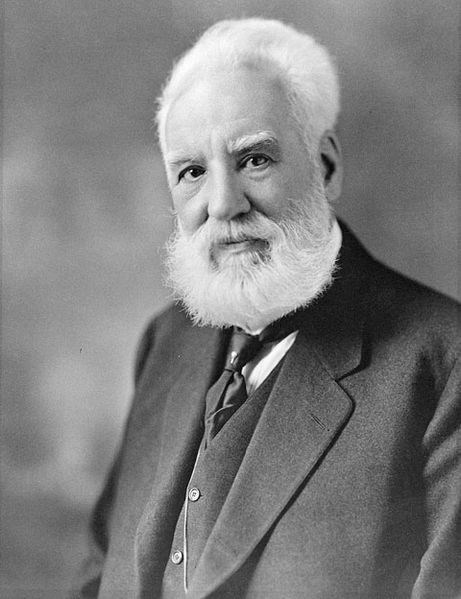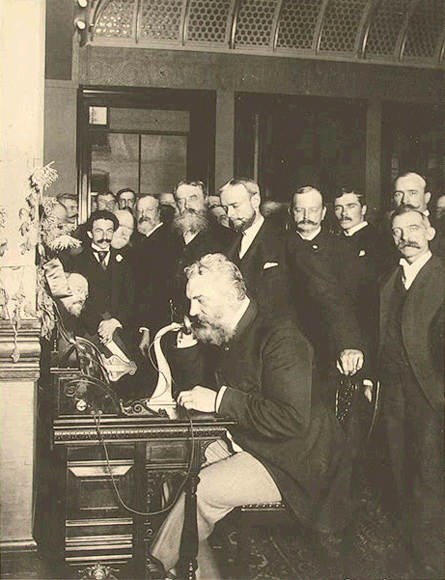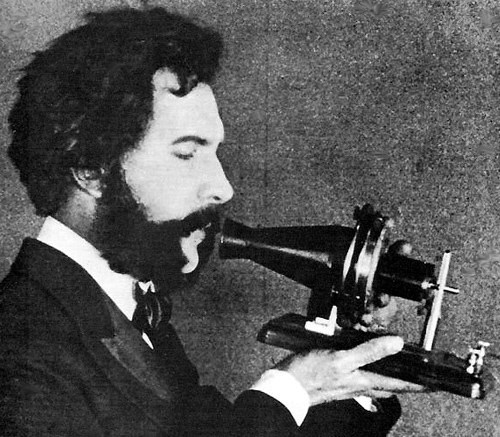 |
| A portait of Alexander Graham Bell (http://en.wikipedia.org/wiki/Alexander_Graham_Bell ()) |
"When one door closes,
another door opens; but we so often look so long and regretfully upon the
closed door, that we do not see the ones which open for us." (Alexander Graham
Bell). For Alexander Graham Bell there were no closed doors because, he
wanted to open all the doors in his life. That's how he ended up inventing
the telephone. Until Alexander Graham Bell invented the telephone in 1876
enabling people to talk to each other with a device. Bell didn't just pick
up his tools and invent the telephone though, when he was younger he studied in
London on teaching the deaf to speak ("Alexander Graham Bell). Bell's
family helped try to teach deaf people to speak. Bell helped many people
in trying to learn to speak in London and in Boston with his father. A
hero must be selfless and hard working. To be selfless one must not be
selfish and want the best for others and for one to be hard working they must
work hard on something for the better of others. Alexander Graham Bell was
not just the inventor of the telephone; he was selfless, hardworking, and
saves people's lives.
 |
| Bell demonstrating his invention to the public (http://www.neatorama.com/2010/03/04/sounds-like-the-life-of-brilliant-man-neat-facts-about-alexander-graham-bell/ ()) |
Bell didn't know it when he
invented the telephone, but his invention went on to save many lives even
today. During Bell's time in helping the deaf speak, he invented the
telephone, starting a new age in technology. "Alexander Graham Bell
(1847-1922) is best known for perfecting the telephone to transmit vocal
messages by electricity. The telephone inaugurated a new age in
communication technology" (Bellis). Because Bell invented the
telephone we can now communicate instantly to call for help. This has
saved many people's lives over the past 140 years and still does because
without Bell's invention, we wouldn't have 911. At first when people had
heard about Bell's invention they were not so sure it worked or that it was
reliable. "Repeated demonstrations overcame public skepticism. The
first reciprocal outdoor conversation was between Boston and Cambridge, Mass.,
by Bell and Watson on Oct. 9, 1876" ("Alexander Graham Bell"). After
Bell demonstrated his invention for the public many times the public began to
believe that his invention actually worked. Later on when it became
commercial, people started relying on their phones for emergencies and carry
their phones with them everywhere in case they need it. So, without Bell
inventing the telephone we would not be able to just pick up a phone and dial
911 when we had an emergency. Bell's invention, the telephone, has saved
millions of lives because now people can just pick up a phone to call for help
when they need it.
In many instances Alexander
Graham Bell thought of the well being of others instead of himself. Before
Bell was a well-known scientist; his father, Alexander Melville Bell, was
teaching the deaf how to speak. "His father, Alexander Melville Bell,
was an expert in vocal physiology and elocution; his grandfather,
Alexander Bell, was an elocution professor" ("Alexander Graham Bell"). Because
his father helped others this show that Bell's father may have inspired him to
help others. The quote could also show that he was not in the business for
the money but to help people that need his help. When Alexander Graham
Bell won an award along with a lot of prize money, instead of spending it on
himself he used it to help others. "The French government awards the
Volta Prize for scientific achievement in electricity to Alexander Graham Bell. He
uses the prize money to set up the Volta Laboratory as a permanent,
self-supporting experimental laboratory devoted to invention" (Bellis). When
Bell won The Volta Prize for his scientific achievement, instead of using the
large money prize on himself, he used it to start a self-sustaining laboratory. This
shows that Bell is selfless and only wants to help others, because he uses the
money he made on helping others. Alexander Graham Bell was a well-known
scientist, and used that to help others and give back to the community.
Alexander Graham Bell spent
half of his life trying to help deaf people speak and the other half working on
his invention, the telephone. Before Bell invented the telephone, he was
known for helping his father teach deaf people to speak. "He went to
Boston in 1871 to teach at Sarah Fuller's School for the Deaf, the first such
school in the world. He also tutored private students, including Helen
Keller" ("Alexander Graham Bell"). This quote shows that Bell worked
hard to help others that were not as fortunate as him. It also shows how
much time he spent helping people like Helen Keller because it was his full
time job to teach the deaf to speak. When Bell was in London, before he taught
deaf people in Boston he helped children in London at Susanna Hull's School for
Deaf Children. "Alexander Graham Bell begins teaching speech to the
deaf at Susanna Hull's school for deaf children in London" ("Alexander
Graham Bell"). Bell taught deaf children in London how to speak just like his
father. This shows how hard Bell and his family worked to help people who
needed their help. Where ever Alexander Graham Bell went he always spent
his time working hard for the good of others.
 |
| (http://www.wired.com/science/discoveries/news/2008/03/dayintech_0310 ()) |
Alexander Graham Bell was not
just the inventor of the telephone; he was a selfless, hardworking, and
saves people's lives. Alexander Graham Bell did not work hard for himself
and the money, he worked hard to help others and eventually he invented a
device that saved many people's lives, even today. Alexander Graham Bell
inspires me because he only wanted to help others and invented something that
saves lives every day. To me that defines a hero and reading about
Alexander Graham Bell has showed me that you never know what will happen unless
you try.
"Alexander
Graham Bell Quotes." Alexander Graham Bell Quotes (Author of The
Mechanism of Speech). Good Reads. Web. 17 May 2012.
"Alexander Graham Bell."
Encyclopedia of World Biography. 2nd ed. Vol. 2. Detroit: Gale, 2004. 129-131.
Gale Virtual Reference Library. Web. 2 May 2012.
"Alexander Graham Bell."
Encyclopedia of World Biography. Detroit: Gale, 1998. Gale Biography In
Context. Web. 2 May 2012.
"Alexander
Graham Bell." Wikipedia. Wikimedia Foundation, 17 May 2012. Web.
17 May 2012.
Alfred,
Randy. "March 10, 1876: 'Mr. Watson, Come Here ... '" Wired.com.
Conde Nast Digital, 10 Mar. 2008. Web. 17 May 2012.
Bailey, Ellen. "Alexander Graham
Bell: Background And Early Life." Alexander Graham Bell (2006): 1.
Biography Reference Center. Web. 2 May 2012.
Bellis, Merry. "Timeline of
Alexander Graham Bell: 1847 To 1922." About.com Inventors. About.com.
Web. 06 May 2012.
Harness,
Jill. "Sounds Like The Life Of Brilliant Man: Neat Facts About Alexander
Graham Bell." Neatorama. 4 Mar. 2010. Web. 17 May 2012.
T. Keilor, Bentley. "Bell,
Alexander Graham." Britannica Biographies (2011): 1. Biography Reference
Center. Web. 30 Apr. 2012.
Page created on 5/18/2012 12:00:00 AM
Last edited 5/18/2012 12:00:00 AM
